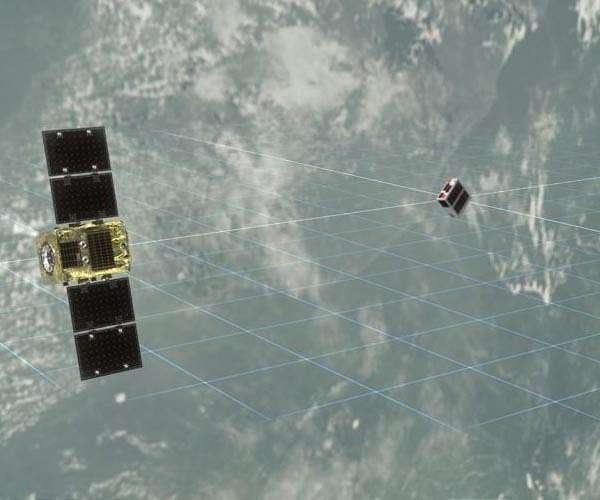
OneWeb, Astroscale, ESA and UK partner to launch space junk servicer ELSA-M (Image Credit: Space Daily)
OneWeb together with Astroscale will seek to safeguard the satellite economy with ground-breaking new spacecraft technology, thanks in part to a new investment of 14.8 million euro. The mission to demonstrate Astroscale’s ELSA-M servicer will launch towards the end of 2024, with ambitious plans to deliver a debris removal service to satellite operators thereafter.
The announcement builds upon Sunrise, a Partnership Programme launched in 2019 between the European Space Agency (ESA) and OneWeb to support the advancement of next generation technologies ranging from artificial intelligence for flying the satellites to new payload and user terminal technology to supporting research in active debris removal.
This latest funding agreement, will be in support of Astroscale Ltd. and their UK partners, and will complete the design of the ELSA-M servicer, progressing through manufacturing up to the satellite pre-integration phase. Once complete, the servicer will be capable of capturing and removing multiple satellites in a single mission, once they reach the end of their operational life in low Earth orbit.
Satellites provide society with vital services including weather forecasting, disaster management, GPS, data for banking systems and broadband. If our orbital environment becomes too congested, we risk losing connectivity at work and in communities. That is why the Sunrise Programme Partners are working together to find solutions for responsible management of space debris.
Massimiliano Ladovaz, Chief Technology Officer at OneWeb, said: “Responsible space is central to our mission at OneWeb and we are committed to sustainable practices in all the environments in which we operate. The development of the ELSA-M servicer prototype is another significant milestone towards a responsible approach to space, ensuring that our satellites can be deorbited and that the low Earth orbit environment is protected as a natural and shared resource.”
John Auburn, Managing Director at Astroscale Ltd., adds, “We’re putting our telecommunications services at risk unless we start cleaning up space. Astroscale’s ELSA-M servicer is designed to build on our ELSA-d demonstration mission to clean up orbital debris. This spacecraft will demonstrate our innovative rendezvous, capture and de-orbit capabilities with a full-size constellation client.
“We plan to launch our commercial service for satellite operators, such as OneWeb and others, soon after the in-orbit demonstration, with a vision to make debris removal part of routine operations by 2030. We are very grateful to the UK and European Space Agencies for their continued support to develop this innovative technology, leading to our commercial services that will contribute to a sustainable economy in space.”
Elodie Viau, Director of Telecommunications and Integrated Applications at ESA, said: “It is vital to ensure the responsible use of space to protect today’s interconnected world, because our digital economy and society rely on the ability to communicate. I am proud of ESA’s track record in fostering innovation in the space industry in Europe, bringing to fruition new ways of ensuring the sustainable use of space, and of the role that ESA’s Partnership Projects play as a trusted partner for investors, operators and industry.”
The U.K’s Science Minister George Freeman said: “With thousands of satellites already in orbit and thousands more being launched every year, addressing the issue of space debris and finding new ways to remove defunct spacecraft and other types of space junk is of ever-increasing importance – to both reduce the cost of debris damage for satellite operators and ensure space is safe and sustainable.
“That’s why, the UK government has made space sustainability a key theme of our National Space Strategy and it is fantastic to see leading roles for UK companies Astroscale and OneWeb in this European Space Agency project, helping us continue to show UK technology leadership in this important area.”
Paul Bate, Chief Executive of the UK Space Agency, said: “Space debris threatens the satellites we depend on every day for vital services, such as navigation, banking and communications.
“That’s why the UK is taking action, by funding new commercial technologies to remove debris from space and working with international partners to lead efforts to promote sustainability. This latest phase of the Sunrise programme partnership between the European Space Agency, Astroscale Ltd. and OneWeb will develop an innovative spacecraft Servicer to remove multiple defunct satellites, putting the UK at the forefront of efforts to clear up space.”
Related Links
ELSA-M at Astroscale
Space Technology News – Applications and Research
|
|
Tweet |
|
|
|
We need your help. The SpaceDaily news network continues to grow but revenues have never been harder to maintain. With the rise of Ad Blockers, and Facebook – our traditional revenue sources via quality network advertising continues to decline. And unlike so many other news sites, we don’t have a paywall – with those annoying usernames and passwords. Our news coverage takes time and effort to publish 365 days a year. If you find our news sites informative and useful then please consider becoming a regular supporter or for now make a one off contribution. |
||
|
SpaceDaily Monthly Supporter $5+ Billed Monthly |
SpaceDaily Contributor $5 Billed Once credit card or paypal |
|
LeoLabs to support Japan Air Self Defense Force with Commercial Space Domain Awareness
Menlo Park CA (SPX) May 25, 2022
LeoLabs, Inc., the world’s leading commercial provider of low Earth orbit (LEO) mapping and Space Situational Awareness (SSA) services, has announced a multimillion-dollar award to provide data and services for the Japan Air Self Defense Force (JASDF). The agreement offers Japan access to the largest set of actionable insights in existence for tracking satellites and orbital debris in low Earth orbit (LEO), all generated from LeoLabs’ global network of phased array radars. LeoLabs will deliver its LEO d … read more









